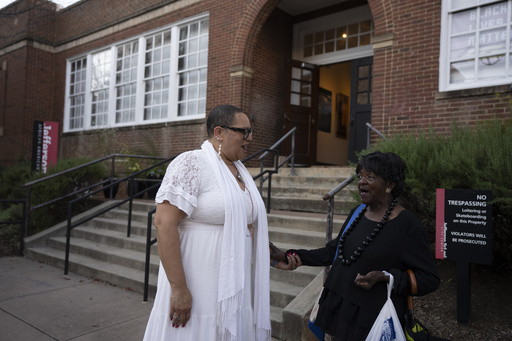
CHARLOTTESVILLE, Va. — This year’s election has become one of the most divisive in American history, with many supporters of each major candidate claiming that the outcome will significantly influence the nation’s future and its adherence to democratic principles. Voters’ perspectives on this stark divide reflect the complexity of the country itself, and Charlottesville, Virginia, serves as a vivid illustration of that range.
Historically, Charlottesville was a gathering place for the Founding Fathers who warned against the perils of political demagoguery. It also became infamous for the “Unite the Right” rally in 2017, during Donald Trump’s presidency, when a large gathering of white nationalists and neo-Nazis committed acts of racist violence responding to the city’s move to remove a Confederate statue. Marchers wielded tiki torches and Confederate flags while chanting hateful slogans.
Tragically, one participant drove a car into a crowd of counter-protesters, resulting in the death of a woman and injuring many others. This shocking event influenced President Joe Biden’s decision to run for office in 2020, as he viewed it as an alarming illustration of racism and antisemitism. In early October, journalists conducted interviews in and around Charlottesville with voters reflecting on the upcoming election, bringing to light the ongoing divide and the consequences of allowing extreme ideologies to flourish.
Activist Jalane Schmidt, who was deeply involved in racial justice during 2017, highlighted the persistent threat posed by extremists. As a religious studies professor at the University of Virginia, Schmidt noted that during the rally preparations, she faced criticism for being too polarizing while advocating against hate. She expressed concern that Trump’s potential return to the White House would jeopardize democracy, echoing the warnings of the Founding Fathers about demagogues.
In a meeting room at First Baptist Church, Senior Pastor Rob Pochek and his congregation condemned the “Unite the Right” rally as antithetical to their values. Pochek described the marchers’ antisemitic messages as profoundly offensive and emphasized that Christian teachings should promote understanding among differing viewpoints rather than enmity. While the group had mixed feelings about Trump, they united in their belief that a choice between Trump and Vice President Kamala Harris reflects poorly on the nation’s options.
Susan Bro, who lost her daughter, Heather Heyer, during the tragic 2017 rally, articulated the awakening of many white residents to the persistent racism in society. Bro expressed deep fear about the nation’s direction if Trump were to win again, questioning whether democracy could endure amid ongoing division and hate. She believes it is crucial for everyone to be vigilant against extremist rhetoric that could normalize hate.
At an early voting location in Charleston, Dan and Ruth Suggs indicated their support for Trump, expressing that neither he nor Harris posed a significant threat to America’s future. They criticized the city’s approach to the Confederate statue’s removal, suggesting greater public engagement was necessary for such decisions. While Dan asserted the importance of free speech, his wife highlighted that there were individuals at the rally who only sought to hear differing opinions.
Among younger voters, perspectives differ based on personal backgrounds. Kushaan Soodan, whose parents immigrated from India, underscored the election’s significance in affirmatively stating that hate has no place in America. Conversely, fellow student Arturo Romero voiced opposition to a Harris victory, asserting that Trump’s rhetoric had been distorted, underscoring his belief in the former president’s positive impact on the economy and international stability.
Leslie Scott-Jones, a lifelong resident of Charlottesville, shared her bewilderment at media narratives portraying society as post-racial after the rally. She recognized the event as a wake-up call but asserted that systemic racism remains pervasive. Despite calls to participate in democracy, Scott-Jones expressed dissatisfaction with the electoral system and decided to support third-party candidate Cornel West, reflecting her hope for a reimagined America.
As the election approaches, concerns about potential political violence and escalating divisions loom large. Scott-Jones admitted these are valid fears but emphasized that the outcome may not significantly influence the broader issues facing the nation. The sentiments expressed in Charlottesville encapsulate the complexities and varying opinions surrounding this critical election, illustrating how the fight for democracy continues to unfold across the United States.
